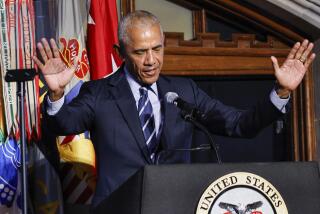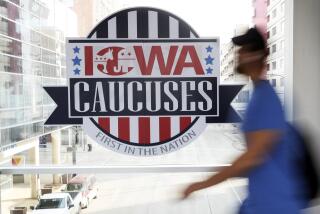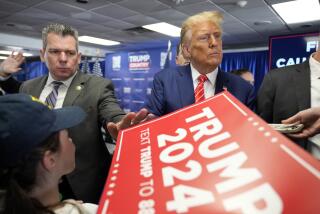Obama visits Iowa to start Midwest tour
Reporting from Ottumwa — He is talking about dry matters of policy—renewable energy and rural economic distress. But there is no question that President Obama’s two-day blitz through the Midwest is an early foray into midterm election campaigns that will be, in part, a referendum on his record.
Obama on Tuesday returned to the state that vaulted him toward the White House, making Iowa the first leg of a three-state tour in which he is defending his economic policies and attempting to show he is attuned to everyday financial stress.
After touring an energy plant in Fort Madison, the president said he wanted to “talk with folks like you about the economic hardship and the pain that this town has gone through and so many people are still feeling.”
Obama is keeping up a campaign-style pace, making at least six stops in which he is talking to students, farmers and high-tech businesses. Along the way, he will try to buoy the prospects of some Democrats in tough election fights this fall.
The Illinois Democrat who is vying to fill Obama’s old U.S. Senate seat, state Treasurer Alexi Giannoulias, is expected to be in the audience when the president visits Quincy, Ill., on Wednesday. The independent newsletter Cook Political Report on Monday changed its evaluation of that race from toss-up to leaning Republican, citing Giannoulias’ latest travails: The FDIC has seized a bank owned by his family.
Another Senate Democratic candidate, Robin Carnahan of Missouri, will join Obama when he tours a biofuel plant in a small town in that state.
With the economy in the grip of a slow recovery, Obama has struggled to find a message that strikes the right balance.
He wants to trumpet tentative strides in creating jobs. But he must also show compassion for families who are still hurting.
James Carville, the longtime Democratic strategist, told reporters recently, “The hardest thing to do in all of communications is dealing with a bad but somewhat improving economy.” The challenge, Carville said, is to “thread the needle” in an economic climate in which “things are getting better when people don’t feel they’re getting better.”
A recent Gallup poll testified to the anxious national mood. About 1 in 5 Americans think it is “fairly” or “very” likely they will lose their jobs over the next year. Meantime, only 41% described their financial situation as “good” or better, the lowest figure in a decade.
At a town hall meeting in Ottumwa late in the afternoon, the president sought to draw a personal connection with people who are unemployed and worried about their future. He said he knew what it was like to be “out of work.” The White House later said he was referring to the period after he graduated from college and to a three-month spell before he landed a job as a community organizer.
More to Read
Sign up for Essential California
The most important California stories and recommendations in your inbox every morning.
You may occasionally receive promotional content from the Los Angeles Times.










